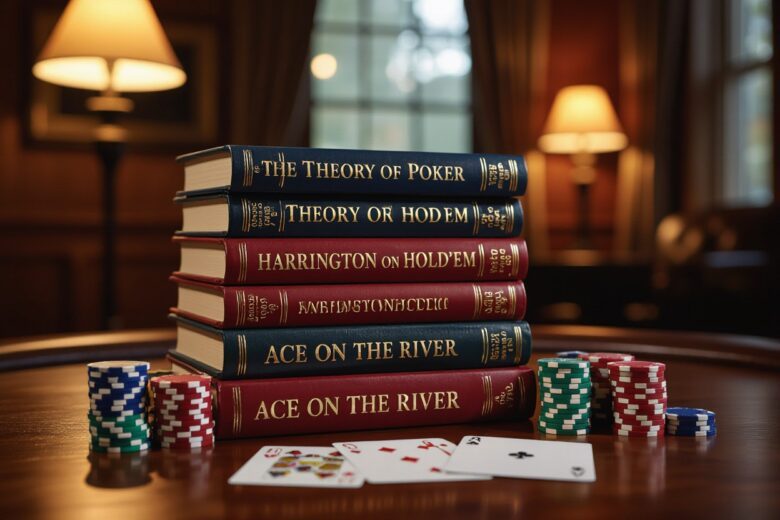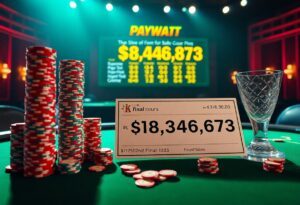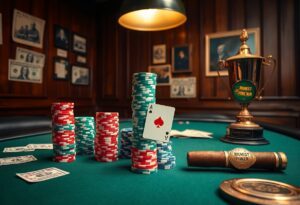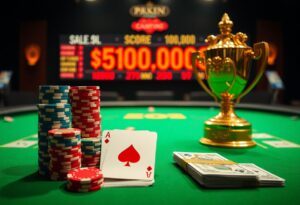Over the years, your poker journey can take many paths, but accelerating your learning curve through quality books remains one of the most effective strategies. Whether you’re a beginner or an experienced player, the right poker literature can transform your game from break-even to profitable. You’ll find that the best poker books offer more than just basic strategies – they provide deep insights into psychology, mathematics, and decision-making processes that you can apply both at and away from the tables. These carefully selected titles have helped shape countless professional players and continue to influence modern poker theory.
The Classics: Timeless Reads That Shaped Poker Strategy
These foundational texts laid the groundwork for modern poker strategy and continue to influence players decades after their initial publication. While some specific examples may feel dated, the core mathematical concepts and psychological insights remain remarkably relevant for today’s games.
“The Theory of Poker” by David Sklansky
Published in 1987, this masterpiece introduces fundamental concepts that shape winning poker strategy. Sklansky breaks down complex mathematical principles into digestible chunks, teaching you about pot odds, implied odds, and the Fundamental Theorem of Poker. The book’s greatest strength lies in its ability to help you understand why certain plays are profitable in the long run, rather than just telling you what to do in specific situations.
“Super/System” by Doyle Brunson
Released in 1978, “Super/System” revolutionized poker literature by being the first book to reveal professional-level strategies to the public. Brunson’s aggressive approach to poker was groundbreaking at the time, and many of his concepts about position play and aggressive betting remain relevant in today’s games.
The book features contributions from other poker legends, each covering their specialty games. While some specific hand recommendations may be outdated for modern play, the sections on reading opponents and maintaining psychological control at the table are timeless. Brunson’s insights into player psychology and table dynamics continue to influence how professionals approach the game today.
Advanced Strategies: Unlocking Higher-Level Play
Moving beyond fundamentals, these advanced poker books research into complex strategies, mathematical concepts, and high-level decision-making processes that separate professional players from amateurs. You’ll discover sophisticated techniques for range-based thinking, exploitative play, and game theory optimal (GTO) approaches.
| Strategic Elements | Implementation Focus |
| Range-based thinking | Multi-street planning |
| Polarized betting | Opponent exploitation |
| ICM considerations | Tournament adaptations |
“Harrington on Hold’em” by Dan Harrington
Dan Harrington’s three-volume masterpiece offers detailed tournament strategy that remains relevant today. You’ll learn the M-ratio concept, zone-based play, and advanced tournament tactics. The books provide practical examples from real tournament situations, helping you understand when to shift gears and how to adapt your strategy as blinds increase.
“No Limit Hold’em: Theory and Practice” by David Sklansky and Ed Miller
This comprehensive guide breaks down complex mathematical concepts into digestible strategies. You’ll master pot odds calculations, implied odds, and advanced betting patterns. The authors present a systematic approach to decision-making that helps you develop a solid theoretical foundation.
The book’s strength lies in its detailed analysis of specific hand scenarios and the underlying mathematical principles. You’ll find thorough explanations of bet sizing principles, position-based strategy adjustments, and methods for maximizing value in different stack-depth situations. The concepts presented form the backbone of modern No-Limit Hold’em strategy.
- Advanced hand reading techniques
- Multi-street planning strategies
- Stack-to-pot ratio considerations
- Tournament-specific adaptations
- Exploitative play concepts
Mindset Mastery: The Psychological Edge in Poker
Your mental game often determines success more than technical skills at the poker table. Top players master their emotions, maintain focus during lengthy sessions, and make rational decisions under pressure. Psychological resilience separates consistent winners from those who struggle with tilt and bankroll-destroying mistakes. These books provide proven frameworks to develop your mental toughness and decision-making abilities.
“Thinking, Fast and Slow” by Daniel Kahneman
Nobel Prize winner Kahneman reveals how your brain uses two distinct systems for decision-making: fast, intuitive reactions and slower, analytical thinking. By understanding these cognitive processes, you’ll spot situations where your instincts might lead you astray at the poker table. The book’s insights help you identify and correct common decision-making biases that cost players money, especially during high-pressure moments.
“The Mental Game of Poker” by Jared Tendler
Tendler applies his experience as a mental game coach to address poker-specific psychological challenges. The book provides actionable strategies to overcome tilt, fear, and confidence issues that plague many players. You’ll learn systematic approaches to identify your emotional triggers and develop personalized solutions for staying focused during tough sessions.
The book stands out through its practical C-game to A-game framework, helping you systematically eliminate mental leaks. Tendler’s methods have helped countless professionals overcome issues like anxiety during high-stakes play, handling downswings, and maintaining concentration during long tournament runs. The second volume builds on these concepts with advanced techniques for peak performance and strategies to handle the unique mental challenges of moving up in stakes.
Real-World Lessons: Insights from Professional Players
“The Book of Poker Tells” by Mike Caro
Mike Caro’s masterpiece revolutionized how players approach behavioral analysis at the poker table. The book breaks down over 100 specific physical and verbal tells, complete with photographs and detailed explanations. You’ll learn to spot subtle signs like hand movements, betting patterns, and timing tells that reveal your opponents’ hand strength. Caro’s work remains the definitive guide on reading poker tells, helping you develop the observational skills needed to gain a significant edge in live games.
“Elements of Poker” by Tommy Angelo
Tommy Angelo’s philosophical approach to poker transcends basic strategy, focusing on the mental game and lifestyle aspects that separate winning players from the rest. The book addresses tilt control, bankroll management, and emotional equilibrium – elements often overlooked by technical poker guides.
Angelo draws from his decades of professional experience to help you develop a sustainable approach to the game. You’ll discover practical techniques for maintaining focus during long sessions, managing your emotional state, and making better decisions under pressure. The book’s unique perspective on poker meditation and mindfulness provides tools for improving your mental game, while its insights into table selection and game choice help optimize your earning potential. Angelo’s emphasis on long-term success over short-term results has made this book a favorite among serious players looking to build a profitable poker career.
Techniques for Improvement: Practical Guides to Enhance Your Game
Moving beyond theory, practical poker guides offer actionable steps to elevate your gameplay. These books break down complex strategies into digestible chunks, allowing you to implement new techniques immediately at the tables. The best practical guides combine real-world examples with clear instructions, helping you develop a systematic approach to decision-making and bankroll management.
“Your Poker Strategy” by Vanguard
Vanguard’s masterpiece delivers a systematic framework for building your unique poker style. The book’s step-by-step approach helps you identify and fix leaks in your game, while providing tools to adapt strategies based on your opponents’ tendencies. You’ll find detailed hand analysis sections that demonstrate how to apply theoretical concepts in real-game situations.
“Poker Math That Matters” by Owen Gaines
This book strips away the complexity of poker mathematics and focuses on calculations you’ll actually use at the table. Gaines presents imperative concepts like pot odds, implied odds, and expected value through practical examples and exercises you can master within weeks.
The true value of Gaines’ work lies in its accessibility. Rather than overwhelming you with complex formulas, each chapter builds upon the previous one, creating a natural progression from basic concepts to advanced applications. The book includes practice problems that simulate real-game scenarios, allowing you to develop quick mental math skills that become second nature during play. Particularly useful is the section on range-based thinking, which transforms abstract probability concepts into practical decision-making tools.
Summing up
So, by investing your time in these vital poker books, you’ll build a solid foundation for success at the tables. From Harrington’s strategic insights to Sklansky’s mathematical approach and Brunson’s timeless wisdom, each book offers unique perspectives to elevate your game. Whether you’re a beginner or an experienced player, these resources will sharpen your decision-making skills and help you understand the psychological aspects of poker. Make these books part of your poker education, and you’ll see significant improvements in your playing style and results.




